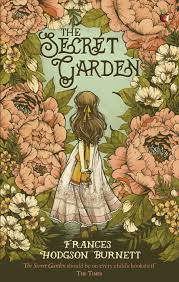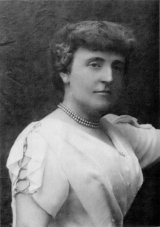The Secret Garden Page #20
The Secret Garden is a novel by Frances Hodgson Burnett first published in book form in 1911, after serialization in The American Magazine. Set in England, it is one of Burnett's most popular novels and seen as a classic of English children's literature. Several stage and film adaptations have been made.
“If you had one,” said Mary, “what would you plant?” “Cabbages an’ ’taters an’ onions.” “But if you wanted to make a flower garden,” persisted Mary, “what would you plant?” “Bulbs an’ sweet-smellin’ things—but mostly roses.” Mary’s face lighted up. “Do you like roses?” she said. Ben Weatherstaff rooted up a weed and threw it aside before he answered. “Well, yes, I do. I was learned that by a young lady I was gardener to. She had a lot in a place she was fond of, an’ she loved ’em like they was children—or robins. I’ve seen her bend over an’ kiss ’em.” He dragged out another weed and scowled at it. “That were as much as ten year’ ago.” “Where is she now?” asked Mary, much interested. “Heaven,” he answered, and drove his spade deep into the soil, “’cording to what parson says.” “What happened to the roses?” Mary asked again, more interested than ever. “They was left to themselves.” Mary was becoming quite excited. “Did they quite die? Do roses quite die when they are left to themselves?” she ventured. “Well, I’d got to like ’em—an’ I liked her—an’ she liked ’em,” Ben Weatherstaff admitted reluctantly. “Once or twice a year I’d go an’ work at ’em a bit—prune ’em an’ dig about th’ roots. They run wild, but they was in rich soil, so some of ’em lived.” “When they have no leaves and look gray and brown and dry, how can you tell whether they are dead or alive?” inquired Mary. “Wait till th’ spring gets at ’em—wait till th’ sun shines on th’ rain and th’ rain falls on th’ sunshine an’ then tha’ll find out.” “How—how?” cried Mary, forgetting to be careful. “Look along th’ twigs an’ branches an’ if tha’ see a bit of a brown lump swelling here an’ there, watch it after th’ warm rain an’ see what happens.” He stopped suddenly and looked curiously at her eager face. “Why does tha’ care so much about roses an’ such, all of a sudden?” he demanded. Mistress Mary felt her face grow red. She was almost afraid to answer. “I—I want to play that—that I have a garden of my own,” she stammered. “I—there is nothing for me to do. I have nothing—and no one.” “Well,” said Ben Weatherstaff slowly, as he watched her, “that’s true. Tha’ hasn’t.” He said it in such an odd way that Mary wondered if he was actually a little sorry for her. She had never felt sorry for herself; she had only felt tired and cross, because she disliked people and things so much. But now the world seemed to be changing and getting nicer. If no one found out about the secret garden, she should enjoy herself always. She stayed with him for ten or fifteen minutes longer and asked him as many questions as she dared. He answered everyone of them in his queer grunting way and he did not seem really cross and did not pick up his spade and leave her. He said something about roses just as she was going away and it reminded her of the ones he had said he had been fond of. “Do you go and see those other roses now?” she asked. “Not been this year. My rheumatics has made me too stiff in th’ joints.” He said it in his grumbling voice, and then quite suddenly he seemed to get angry with her, though she did not see why he should. “Now look here!” he said sharply. “Don’t tha’ ask so many questions. Tha’rt th’ worst wench for askin’ questions I’ve ever come across. Get thee gone an’ play thee. I’ve done talkin’ for today.” And he said it so crossly that she knew there was not the least use in staying another minute. She went skipping slowly down the outside walk, thinking him over and saying to herself that, queer as it was, here was another person whom she liked in spite of his crossness. She liked old Ben Weatherstaff. Yes, she did like him. She always wanted to try to make him talk to her. Also she began to believe that he knew everything in the world about flowers. There was a laurel-hedged walk which curved round the secret garden and ended at a gate which opened into a wood, in the park. She thought she would slip round this walk and look into the wood and see if there were any rabbits hopping about. She enjoyed the skipping very much and when she reached the little gate she opened it and went through because she heard a low, peculiar whistling sound and wanted to find out what it was. It was a very strange thing indeed. She quite caught her breath as she stopped to look at it. A boy was sitting under a tree, with his back against it, playing on a rough wooden pipe. He was a funny looking boy about twelve. He looked very clean and his nose turned up and his cheeks were as red as poppies and never had Mistress Mary seen such round and such blue eyes in any boy’s face. And on the trunk of the tree he leaned against, a brown squirrel was clinging and watching him, and from behind a bush nearby a cock pheasant was delicately stretching his neck to peep out, and quite near him were two rabbits sitting up and sniffing with tremulous noses—and actually it appeared as if they were all drawing near to watch him and listen to the strange low little call his pipe seemed to make. When he saw Mary he held up his hand and spoke to her in a voice almost as low as and rather like his piping. “Don’t tha’ move,” he said. “It’d flight ’em.” Mary remained motionless. He stopped playing his pipe and began to rise from the ground. He moved so slowly that it scarcely seemed as though he were moving at all, but at last he stood on his feet and then the squirrel scampered back up into the branches of his tree, the pheasant withdrew his head and the rabbits dropped on all fours and began to hop away, though not at all as if they were frightened. “I’m Dickon,” the boy said. “I know tha’rt Miss Mary.” Then Mary realized that somehow she had known at first that he was Dickon. Who else could have been charming rabbits and pheasants as the natives charm snakes in India? He had a wide, red, curving mouth and his smile spread all over his face. “I got up slow,” he explained, “because if tha’ makes a quick move it startles ’em. A body ’as to move gentle an’ speak low when wild things is about.” He did not speak to her as if they had never seen each other before but as if he knew her quite well. Mary knew nothing about boys and she spoke to him a little stiffly because she felt rather shy. “Did you get Martha’s letter?” she asked. He nodded his curly, rust-colored head. “That’s why I come.” He stooped to pick up something which had been lying on the ground beside him when he piped. “I’ve got th’ garden tools. There’s a little spade an’ rake an’ a fork an’ hoe. Eh! they are good ’uns. There’s a trowel, too. An’ th’ woman in th’ shop threw in a packet o’ white poppy an’ one o’ blue larkspur when I bought th’ other seeds.” “Will you show the seeds to me?” Mary said. She wished she could talk as he did. His speech was so quick and easy. It sounded as if he liked her and was not the least afraid she would not like him, though he was only a common moor boy, in patched clothes and with a funny face and a rough, rusty-red head. As she came closer to him she noticed that there was a clean fresh scent of heather and grass and leaves about him, almost as if he were made of them. She liked it very much and when she looked into his funny face with the red cheeks and round blue eyes she forgot that she had felt shy.
Translation
Translate and read this book in other languages:
Select another language:
- - Select -
- 简体中文 (Chinese - Simplified)
- 繁體中文 (Chinese - Traditional)
- Español (Spanish)
- Esperanto (Esperanto)
- 日本語 (Japanese)
- Português (Portuguese)
- Deutsch (German)
- العربية (Arabic)
- Français (French)
- Русский (Russian)
- ಕನ್ನಡ (Kannada)
- 한국어 (Korean)
- עברית (Hebrew)
- Gaeilge (Irish)
- Українська (Ukrainian)
- اردو (Urdu)
- Magyar (Hungarian)
- मानक हिन्दी (Hindi)
- Indonesia (Indonesian)
- Italiano (Italian)
- தமிழ் (Tamil)
- Türkçe (Turkish)
- తెలుగు (Telugu)
- ภาษาไทย (Thai)
- Tiếng Việt (Vietnamese)
- Čeština (Czech)
- Polski (Polish)
- Bahasa Indonesia (Indonesian)
- Românește (Romanian)
- Nederlands (Dutch)
- Ελληνικά (Greek)
- Latinum (Latin)
- Svenska (Swedish)
- Dansk (Danish)
- Suomi (Finnish)
- فارسی (Persian)
- ייִדיש (Yiddish)
- հայերեն (Armenian)
- Norsk (Norwegian)
- English (English)
Citation
Use the citation below to add this book to your bibliography:
Style:MLAChicagoAPA
"The Secret Garden Books." Literature.com. STANDS4 LLC, 2024. Web. 26 Nov. 2024. <https://www.literature.com/book/the_secret_garden_427>.




Discuss this The Secret Garden book with the community:
Report Comment
We're doing our best to make sure our content is useful, accurate and safe.
If by any chance you spot an inappropriate comment while navigating through our website please use this form to let us know, and we'll take care of it shortly.
Attachment
You need to be logged in to favorite.
Log In